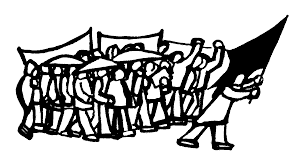 by Dave Riley
by Dave RileyI'm working on a few wiki projects at the moment in an attempt to skill up and pull a few initiatives together.
Maybe you don't know what a wiki is.
So there hangs a tale -- what's a wiki?
A wiki is a lot of things -- but I guess the marker I like most is that wikis are collaborative websites.
Wikipedia is one huge collaborative website for instance where anybody can edit content.
And that's what I'm keen on -- " a genuinely interactive environment rather than 'a glorified television channel'—one in which people not only would browse pages but also would edit them" (ref) . That's a wiki.
So at the moment we're creating --something akin to God creating Adam or Eve out of web stuff -- a wiki about 'encouraging, developing and supplying tools to change the world'.
It's called it, provisionally,( after a US publication) The Activist Toolkit.
Come visit. Check it out. Interact by adding content and tweaking, changing or renovating what's there. Let's create own Activism Wikipedia for Oz-- a toolkit for what we do or need to do to change the world , unfuck it or whatever. The unfuck-the-world-wiki!
It's about sharing our skills and knowledge. It's an exercise in fostering DIY. It even has a section on how to wiki...
A few partners are signed up but hey! this is an open invitation. Come on over and edit. Contribute.
Perhaps you are wondering, how can I ask any Tom Dick or Harriet to freely redecorate and redo? The answer is that I'm learning to trust the process and the potential because my web experience tells me that despite the many fears about losing control, there are too many advantages with open access for us lefties to be conservative in regard to platforms such as these.
(A little bit of humility wouldn't go astray either.)
And, I tell you, the left is plagued by web conservatives who don't trust the new tools that are out there. The embrace is so slow. But once you've been out there leading with your chin for a few years you soon overcome such fears and learn how unfounded they are.
Thats' my own experience. Relax. Go with the almighty world wide webly flow.
Interact. Collaborate.
Here are some wise and very true words:
Think of an open wiki space as a home that leaves its front door unlocked but doesn’t get robbed because the neighbors are all out on their front steps gossiping, keeping a friendly eye on the street, and never missing a thing. This ethic is at the heart of "SoftSecurity," which relies on the community, rather than technology, to enforce order. As described on the MeatballWiki: "SoftSecurity is like water. It bends under attack, only to rush in from all directions to fill the gaps. It's strong over time yet adaptable to any shape. It seeks to influence and encourage, not control and enforce." Whereas "hard security" functions by restricting access or hiding pages, wikis save copies of successively edited versions; thus, work that has been deleted or defaced can be recovered with a couple clicks of the mouse. Changes are readily detected (e-mail or RSS alerts can announce page edits), and deleting flames or unconstructive contributions is usually easier than creating them.....It’s undeniably true that determined vandals can make real pests of themselves. But an open environment also encourages participation and a strong sense of common purpose, so the proportion of fixers to breakers tends to be high, and a wiki will generally have little difficulty remaining stable—assuming that people see value in its existence and have a genuine interest in keeping things tidy. As Clay Shirky observes: "A wiki in the hands of a healthy community works. A wiki in the hands of an indifferent community fails. The software makes no attempt to add ‘process’ in order to keep people from doing stupid things." from Wide Open Spaces: Wikis, Ready or Not]
